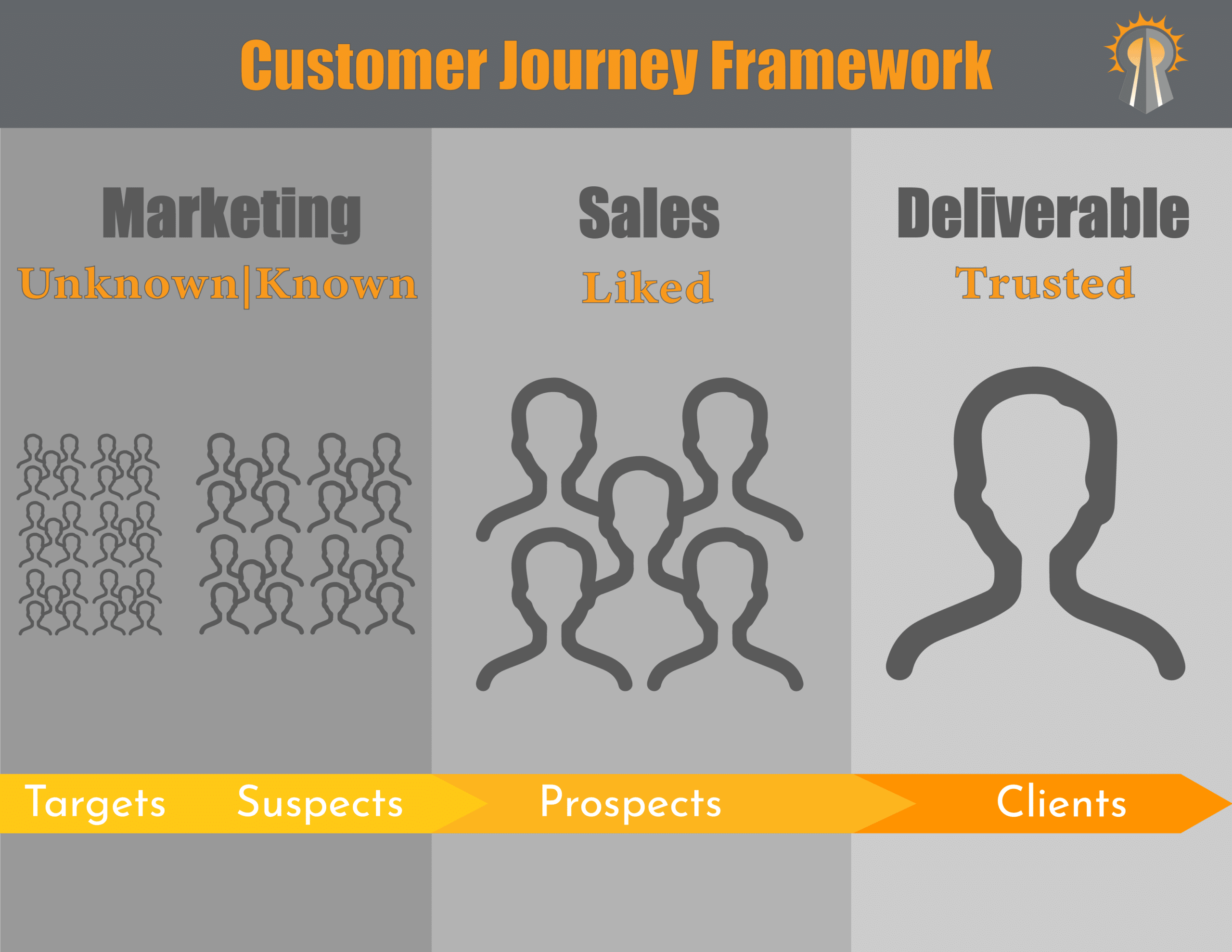Customer Journey Framework
Home » Customer Journey Framework

Customer Journey Framework Fundamentals
Find Targets
We build a list of people we think we'd like to work with—people with names and faces)—then we start marketing to them.
Become "Known"
These Targets have never heard of us. We are “Unknown” to them.
Marketing must make Targets aware of our company and move us from “Unknown” to “Known” to “Liked” in the mind of the Customer/Buyer.
Multiple Leads
The ultimate measure of Marketing’s success is how many Leads are delivered to the Sales team.
Quality of Lead is a close second.
Qualify Leads
The first task of the Sales team is to Qualify Leads – “Are they a good fit for us? Are we a good fit for them?”.
After that, it’s Sales’ responsibility to complete the sales process and close every Opportunity that comes their way.
Opportunities
Opportunities can be either Won or Lost.
However, EVERY Opportunity should be closed.
It should never fall through the cracks.
Ultimate Success
The ultimate measure of Sales success is revenue generated.
Customer's Journey
Target → Suspect → Lead → Prospect → Client
Contact
A CRM record for an individual person, and also someone who is generally in the Customer Journey. Some companies use CRM to track Vendor and Partner Contacts as well; however, when we refer to “Contacts” in Zero Point Selling we’re speaking specifically about a person in the Customer Journey.
Target
A Contact who is a potential customer. Your company is Unknown to them (they have no idea who you are). Minimum information for marketing to a Target is first name, last name, and location. Use “light touch” marketing to introduce your firm and its value proposition. Try different offers/value exchanges until the Target completes one value exchange.
Suspect
A Target who through successful marketing has become aware of your company – you are Known to them - and opted in to receiving additional marketing from you by completing at least one value exchange. Suspects are NOT ready for a Sales discussion. Keep providing value and offering value exchanges to learn more about their needs while reinforcing your own identity and capabilities in relation to those needs.
Lead
A Suspect who has expressed explicit interest in exploring a business relationship between your two companies. This is a temporary, short-term state. A Lead should be qualified quickly by a sales person. There are three possible outcomes to Lead Qualification: 1) There is a valid Opportunity. The Lead is promoted to Prospect, an Opportunity is created, and the Opportunity is handed off to the Sales Team to manage. 2) There is not a valid Opportunity at this time but there might be in the future. The Lead is downgraded to Suspect, the reason noted in CRM, and he/she continues to receive marketing. 3) There is no valid Opportunity and likely never wil l be. The Lead is downgraded to “Do Not Market,” the reason noted in CRM, and the Contact is removed from all Marketing campaigns.
Prospect
A Contact going through your company’s Sales process. A Prospect must have a properly qualified Opportunity attached/associated to them. At the conclusion of the Sales process, a Prospect either becomes a Client (Opportunity was Closed/Won, Transaction Completed) or is downgraded to Suspect (Opportunity was Closed/Lost).
Client
A Contact who has purchased and paid for at least one product or service from your company. There are rare occasions where contracts are signed but for various reasons a transaction is never completed. Because of that, a Prospect remains a Prospect until one transaction is completed and paid for and the Sales person remains responsible for him or her.



